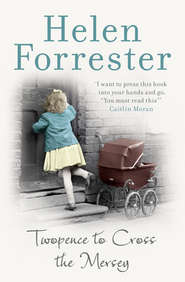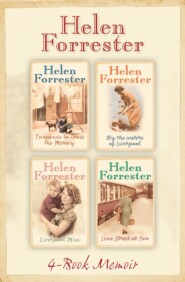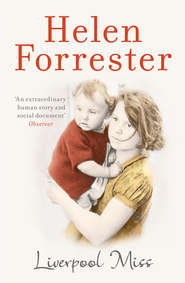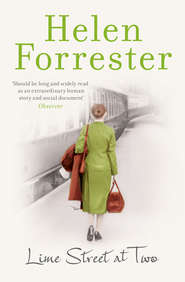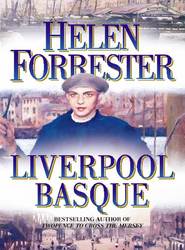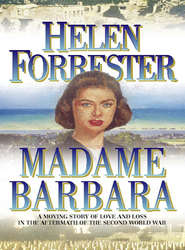По всем вопросам обращайтесь на: info@litportal.ru
(©) 2003-2024.
✖
By the Waters of Liverpool
Настройки чтения
Размер шрифта
Высота строк
Поля
Father and Alan were seated on old paint cans, trying to rewind the thread neatly round the handle of a time-worn cricket bat that one of Alan’s colleagues had given him. Both had nodded to me when I came in; now they started to argue as to the best way to secure the thread.
‘Snap!’ came a delighted shout from Tony under the table. ‘I’ve won. I’ve won!’
‘No, you haven’t,’ responded Brian indignantly. ‘Something’s wrong. All the kings have been played before. There must be an extra one in the pack.’ He had a most retentive memory, but neither Edward nor Tony would accept his contention. An altercation broke out, as they scrambled round in the tiny space, while they checked the incredibly battered pack of cards with which they always played.
I ate my tartlet, while Mother leaned down from her chair and shouted at them. The raised voices vibrated through my wracked body. The tartlet did nothing to assuage my hunger, and I considered eating the lunch which I had brought back home. But I was not sure that there was enough bread in the house to provide me with lunch the following day, so I left it wrapped up in its old margarine papers.
I went upstairs and took a piece of cloth from a pile at the back of a dusty, built-in shelf in the bedroom. These rags had been accumulated from bits of sheeting and garments bought from the secondhand shop and torn into squares. Mother, Fiona and I used the same collection for our periods, washing them again and again. We were always nervous of running out of them.
The pain was rapidly easing now, and I went downstairs again, through the living room where a fight between the boys seemed about to break out, through the little back kitchen with its clutter of unwashed dishes, into the tiny backyard, lined with brick, to the lavatory by the far wall.
We were lucky to have a flush lavatory to ourselves. There was still a number of courts in Liverpool, surrounded on all sides by houses containing a family in each room, where all the inhabitants shared two lavatories set in the middle of the court.
Ours was a dank, cold outhouse, and its pipes or its tank froze every winter, causing bursts which sometimes took our aristocratic landlord weeks to repair. Copies of the Liverpool Echo lay on the long wooden seat, for use instead of toilet paper.
When I returned, Fiona had filled the hot water bottle for me and I thankfully took it and went up to bed, leaving the family to cope as best they could with the work I usually did.
The bed I shared with Fiona and Avril now boasted a bottom sheet and three pillows with pillow cases. The linen was grey with poor washing with insufficient soap, and sometimes with no soap or hot water; but it indicated an improvement over earlier days when I had slept on a wad of newspaper covering a door set on bricks, with an old overcoat to keep me warm.
I crawled on to the lumpy, smelly mattress and drew the two thin blankets up to my chin. I placed the hot water bottle carefully on my aching stomach; it was so hot that it seemed as if it might skin me. The rest of me was very cold despite the comparative mildness of the weather, and my knee joints and ankles hurt quite sharply whenever I moved.
Then the tears pent up during the day exploded and I cried bitterly until I could cry no more. I cried from weakness, from cold, from hunger, from despair that life would never get any better, a holocaust of loneliness, of frustration, which seemed to pick up brief pictures of the pain-filled day and whirl them maddeningly in my head. Despite my fear of burning in hell if I did not go to Confession, I began to pray passionately to be allowed to die.
But God evidently had other things in mind for me, because I continued to survive.
Eight (#ulink_936c2fe9-2cda-53a8-9578-37a5f98d28fe)
I slept so deeply that I did not hear Avril or Fiona get into bed, but when Father’s alarm clock clamoured its warning of six o’clock, I was automatically out of bed and on my feet in a flash, anxious to get into the kitchen before the others, in order to wash myself in private.
Father trailed down the stairs ahead of me dressed in the tattered remains of a camel-hair dressing gown his sister had given him for his sixteenth birthday – the only garment apart from what he had been wearing that he had brought from our old home. He went straight to the kitchen range to rake out the cinders and build a new fire, while I put a kettle of water on the gas stove for his shaving and for Mother’s early morning cup of tea.
I filled the washing-up basin with cold water from the tap, stripped off and quickly washed myself from head to foot. Mostly I had to make do with water and a cotton rag – occasionally there was soap for my face. When the kettle boiled, I padded across the tiles, naked, filled a cup and handed it to Father through a crack in the door. He then shaved, without a mirror, in the living room, using an old-fashioned cut-throat razor and a stump of shaving soap. As soon as I had some clothes on, he would enter the kitchen and make Mother’s tea, occasionally holding the razor dripping with soapsuds in his left hand, half his face still lathered, the other half shining clean. The early morning offering of tea was one of the few things Mother appreciated about Father. She always thanked him and drank the weak, scalding liquid slowly, while shouting instructions about clothes or breakfast to various members of the family.
Fiona was usually the main target of her criticism in the mornings. In all her younger days Fiona never managed to prepare her clothes or lunch for the following day. The fact that the boys took it for granted that their clothes, books and lunches would be prepared for them and that they could, therefore, be considered equally inefficient was lost upon Mother; girls were capable of looking after themselves; boys were not.
If the fire that Father had made did not catch, I tried again with it, while he washed in the kitchen. First, old copies of the Echo were crumbled up to make a base, then a small pyramid of wood chips, bought from the chandler in neat wire-bound bundles, was built, upon which small coals were laid. A match was set to the paper and, if the wind was in the right direction, the chimney would draw the flames upwards and the fire would catch. In addition to coal, we burned vegetable peelings wrapped in newspaper, worn-out shoes, anything that would burn was burned. I had long since given up collecting rubbish from the streets to keep the fire going, because I felt we should be able to afford enough coal to give us a little fire, morning and evening. Nevertheless, despite five of us having work, the coal cellar was often empty, particularly in the autumn and spring, when Mother felt we should be able to manage without heating. At such times we kept the windows tightly closed and the damp, badly constructed house acquired an icy stuffiness, an unwholesome exhalation of nine half-washed bodies.
This morning, Fiona, wandering about in her grubby nightgown, kindly laid the breakfast table for me and fed Edward and Avril.
Alan had recently very proudly begun to shave with a safety razor. He was rather slow at it, because his face was a dreadful mass of acne spots, great pustules painful enough in themselves without an added nick from the razor. Sometimes the pimples came up on the back of his neck and the pressure of a stiff collar band aggravated them, until they became big open sores that took a long time to heal.
While Alan shaved, Brian and Tony washed themselves. They pushed and shoved against each other, as each tried to insert a finger into the tap, so that they were doused by the resultant spray. The stone tiles of the kitchen were often running with water by the time they had finished.
Avril and Edward, having been perfunctorily washed in warm water before they went to bed, got a quick wipe around their mouths with a damp cloth and a flick of the comb from either Mother or me.
Except for Mother and me, everybody ate a small dish of cornflakes with milk, followed by a slice of bread and margarine, sometimes with a little marmalade. Weak tea was the drink of the whole family. In the interests of economy, Mother and I ate a piece of bread and margarine only.
Quite frequently, Mother did not work in the mornings, so often the children came home at lunchtime to a hot meal, usually of minced meat or of eggs, with potatoes and cabbage or carrots. When she did work before noon, a meal of bread and margarine and cold meats was prepared by Mother or me and left on the table for them, and we tried to provide something hot for them at teatime.
Father and Alan took a lunch with them of bread, margarine and cheese. Since I made up the lunches, I always made mine last, and there never seemed to be any way in which I could divide the small amount of Canadian red cheese so that I could have some without leaving them short. The severe illness I had suffered two years earlier had left me very apathetic about myself; it was enough for me if I could crawl through the day without incurring either Mother’s or Mr Ellis’s wrath and perhaps get a kind word from my dedicated night school teachers.
Mother was a demonstrator. She took short contracts with department stores who wanted to launch new kitchen gadgets, and she stood in the store and showed people how to use them. Occasionally, she did door-to-door selling for vacuum cleaner companies, family photographers, Christmas card publishers or sweet firms. When doing outside work, she wore an all-enveloping leather coat which she had bought second hand. This protected her from Liverpool’s damp, cold wind, and, despite its bulk, she still managed to look elegant in a faded way. She had a lovely carriage and an authoritative voice with a pure Oxford accent. She was a very good saleswoman.
Her supervisor in a vacuum cleaner company, who once called at the house, said admiringly, ‘She could steal your front door key off you and sell it you back before you knew it had gone.’
Father received this doubtful praise in stiff silence, while his guest threw a cigarette stub into the hearth and smoothed his curled moustache.
I do not know what Mother thought of some of the men with whom she worked, but it is doubtful if their crassness bothered her much. She was so sure of herself, so certain of her social superiority despite our current circumstances, that she was to a degree armoured against them.
Father was different. He was abject in his failure and very easily hurt. His public school training, followed almost immediately by war service in Russia during the Revolution, had given him little preparation for a world which had changed completely by the time he came home. He might have survived better had the Depression – and a large family – not added to his difficulties. Like many soldiers returning from the First World War he was emotionally and physically drained by its unremitting horrors; there was little real strength left; and I could guess at the cold flame of hatred in his heart, when faced with a runt of a salesman, who was probably doing rather better than he was as a City clerk.
Mother came downstairs with the coarse white teacup in her hand, and paused when she saw me in the hall to ask if I felt better. I said I did. How could I complain of overwhelming fatigue to someone who looked like a haggard ghost herself?
As we stepped out of the house into a beautiful, rain-washed morning, glad to be away from a fetid, crowded home, Alan offered to pay my tram fare to work. He was shy about referring to my aches and pains of the previous day, but he was well accustomed to their occurrence.
‘No, dear,’ I said. ‘I shall be all right. In fact, the exercise is good for me.’ And I marched beside him down the street as if I had not a care in the world. I could not take his pocket money; but I loved him for the sheer kindness of the offer, and our conversation held more than its usual friendly warmth.
‘The man from the furniture shop came last night – after you’d gone to bed,’ he informed me, as we paused to look in the window of the bicycle shop at the corner of Bold Street; and he sighed over black enamelled frames and racing handlebars.
‘Oh, dear!’ I exclaimed. ‘What now?’
‘Threatening to take it away again.’
‘Haven’t they been paid lately?’
‘Suppose not,’ he replied gloomily.
‘Oh, blow. It’s such an appalling waste, Alan. Mummy and Daddy make the weekly payments for a while. Then the stuff is repossessed – but we still have to pay for it – it doesn’t get us off the hook. It’s so stupid. Really, they’re absolutely crazy.’
‘Humph.’
He was not very interested. He never used our front sitting room. His friends did not come to visit – he always met them on the cricket or football field or in the park, where they would sometimes kick a tennis ball about in an impromptu game.
I was very interested, because payments for the furniture represented a heavy drain on our income. It was money that could have been spent on food and coal. Mother always hankered after some semblance of prosperity, and this was the third roomful of sitting-room furniture she had bought on the hire-purchase system, while ignoring our frantic need for bedding and beds, coal, hot water and food. It was easy to obtain furniture for a very small down payment and weekly payments, laden with interest. Failure to pay resulted in prompt repossession of the furniture, without releasing the buyer from his financial commitment. So the loss could be a heavy one, particularly if one had nearly completed the payments. The three separate firms we had to pay or face being sold up entirely by the bailiff, swallowed enough money to have fed us well. Twice the sitting room had been emptied by phlegmatic furniture removers, well used to pushing their way into the houses of debtors. Now it seemed that it might happen again.
Nine (#ulink_ad091ddb-f4ee-579a-96db-2f0fc1e1fb09)
The great port of Liverpool lies on a series of hills rising from the waterfront, and each day I climbed the long slopes from the city centre, on my way home. I passed concert halls, hospitals, surprisingly finely built Edwardian public houses, rows of little shops and tasteful Victorian houses, some of which were falling into decay. Every so often there was a newsagent’s and tobacconist’s shop, and I depended upon the hastily chalked newspaper headlines displayed on boards outside their shops to alert me to the big news of the day. They currently dealt with the crises of the Spanish war, about which Miriam frequently held forth passionately in the office. She foretold quite accurately that it was but a dress rehearsal for a much bigger conflict. They also announced the forthcoming coronation of George VI and his plump little Duchess, Elizabeth. Some of these shops were decorating their windows with souvenirs, coronation mugs, flags and brooches. A number of defiant people still wore pins and brooches with the insignia of Edward VIII, to show they thought that he should be the king, despite his intention of marrying an American divorcée.
I never saw a billboard that dealt with Liverpool’s fearful slums, some of the worst in the country, nor the hunger in them. Occasionally an increase in the number of unemployed was mentioned, and a great march by workless men who walked all the way to London got some attention. The slums with their suffering inhabitants had always been part of the Liverpool scene; they were not interesting.
Trudging homeward through pouring, slashing rain, I had no particular desire to arrive. Too often more problems, more worries awaited me.
This evening, to my astonishment, there was good news. Fiona had received a letter asking her to go the following afternoon for an interview with a magazine-distributing agency. She was as agitated as an aspen in the wind, and while I ate my tea, she discussed with Mother what she should wear, as if she had a wardrobe full of clothes instead of a single blouse, a skirt and two dresses which were almost outgrown.
Вы ознакомились с фрагментом книги.
Приобретайте полный текст книги у нашего партнера:
Приобретайте полный текст книги у нашего партнера:






